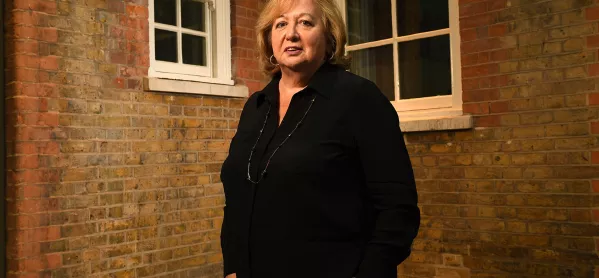Exclusive: ‘Let TAs do teacher training on paid leave’

A union representing teaching assistants is exploring routes that will make it easier for them to become teachers.
The general secretary of Unison, Britain’s largest trade union, has told Tes she wants to find new ways in which TAs can achieve degree-level qualifications needed to become teachers - as well as how they can be funded to take paid-leave away from school to pursue their studies.
Christina McAnea (pictured) said working with the union’s current training providers such as the Open University could be one way to make it happen.
Read: Call for TA mental health support as anxiety soars
Exclusive: DfE looks to TAs to help solve teacher shortages
Support staff: First-ever drop in TA numbers a ‘serious problem’
“It’s the same in hospitals where you’ve got higher level health care assistants who are not that far away from being fully-qualified nurses but need certain additional qualifications and training to get them over that bridge as it were …you need a degree to be a teacher and to be a nurse so these are things that I think we need to look at [such as] are there different ways into these things?
“I know that’s quite controversial in some areas, and I’m not saying you wouldn’t need a degree-level qualification to be a teacher - I’m just saying is there a route that would make it easier for teaching assistants to achieve that?”
Data shows there are more than 270,000 full-time TA posts, and that they make up almost a third of the school workforce in England.
And the idea of some of them becoming teachers to help solve the teacher recruitment crisis is something already being mooted by the DfE.
Mrs McAnea added: “Ideally I would love to see us explore things like that…Can we work with employers [schools] and [training] providers and how would we attract members who are interested in progressing into higher level qualifications?
Is there something we can do around funding for that? Can we partially or wholly fund it?... Can we negotiate agreements with employers so that people get paid leave to go and do this …There are all these things that I would like to be able to do, so ideally I would love us to be in a position, if that was part of the offer, where if we’ve got a teaching assistant that wants to become a teacher then we’ve got an offer for them that would help them achieve that.”
Mrs McAnea, who took up her post in January, pledged to set up a National Unison College as part of her campaign to become general secretary.
She said “We’re not going to build a college or have a building called the Unison College [but instead] it will be an offer wrapped up in something that we call the Unison College.
“What I want us to do in the long-term is to deliver more courses that would count towards CPD, so, for example, if you’re aiming to become a higher level teaching assistant and you maybe have to keep a portfolio, maybe we could provide some of the training that would count towards that.
Can we do a deal with employers [e.g. schools] in terms of some learning agreements where we could say ‘we’re prepared to work with you and support our members and we’ll give you some of this training -what is it you can provide? Can we work together on this?’
“We would work with schools on what level of training would they like their staff to have and how can we help support that?”
Mrs McAnea also says schools should spend more of their training budgets on support staff.
She added: “With the vast majority of training budgets for schools - probably something like 90 per cent of it, if not higher, is spent on teacher training - and I’m not criticising the training that teachers get, but schools have to be investing in the other staff in the schools, particularly when you think there’s as many teaching assistants as there are teachers [when factoring in staff who job share] and yet they get nothing like the training and support that they should in order to make a proper contribution.”
You need a Tes subscription to read this article
Subscribe now to read this article and get other subscriber-only content:
- Unlimited access to all Tes magazine content
- Exclusive subscriber-only stories
- Award-winning email newsletters
Already a subscriber? Log in
You need a subscription to read this article
Subscribe now to read this article and get other subscriber-only content, including:
- Unlimited access to all Tes magazine content
- Exclusive subscriber-only stories
- Award-winning email newsletters
topics in this article



